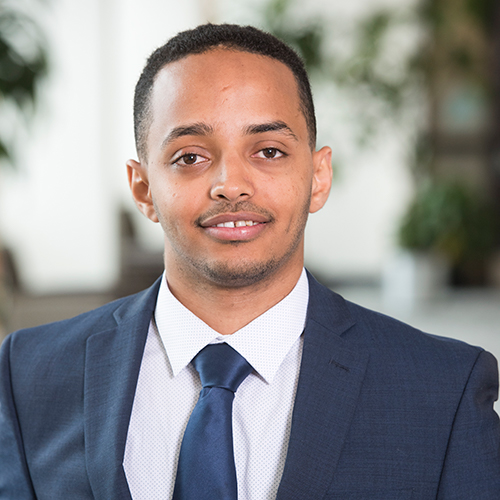
Nahom Mossazghi earns prestigious NIH award for neurotechnology research
By Deirdre Manion-Fischer
Graduating senior Nahom Mossazghi received a highly selective scholarship this year from the National Institutes of Health (NIH). The Undergraduate Scholarship Program (UGSP) offers students up to $20,000 for education and living expenses, and guaranteed employment at the NIH following graduation. Mossazghi is one of only twelve undergraduates who received the award from an applicant pool of about three hundred.
Mossazghi has a glowing track record of undergraduate research in complementary areas—neurophysiology and biomedical engineering. In summer 2016, Mossazghi joined Tim Ebner’s lab as part of Life Science Summer Undergraduate Research Program (LSSURP). The following summer, he also began working in Suhasa Kodandaramaiah’s mechanical engineering lab through an internship supported by MnDRIVE Brain Conditions, the North Star STEM Alliance, and the McNair Scholars Program. Mossazghi continues to work in both labs.
In Ebner’s lab, Mossazghi began studying oscillations in neural activity in a mouse model of Episodic Ataxia type 2 (EA2). EA2 is a neurological disorder characterized by transient motor attacks that can be induced by stress, exercise, caffeine, or alcohol. Mossazghi worked on correlating certain brain wave patterns to the onset of the motor attacks.
To gain experience engineering new research tools for neuroscience, Mossazghi joined Kodandaramaiah’s lab. There, he worked with graduate student Leila Ghanbari on a brain window technology in mice. It works by replacing a part of the mouse’s skull with a 3D printed transparent window. “It gives us clear access,” Mossazghi says, “it's like having a window to the brain.”
For the first time, this technology allows optical imaging at cellular resolution over a large section of the cerebral cortex. At the same time, neuroscientists have a direct interface with the brain to use electrical recording probes and stimulators. This will make new types of studies possible, including observing the effects of neuromodulation therapies.
After he graduates in May, Mossazghi will start a fully paid research traineeship at a laboratory at the National Institutes of Health in Bethesda, Maryland. Once he completes a yearlong appointment there, he plans to enroll in an MD-PhD program in neuroengineering, another step on his path to becoming a neurosurgeon and pursuing clinical research work.
Links
Undergraduate Scholarship Program